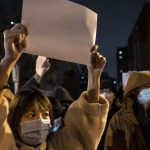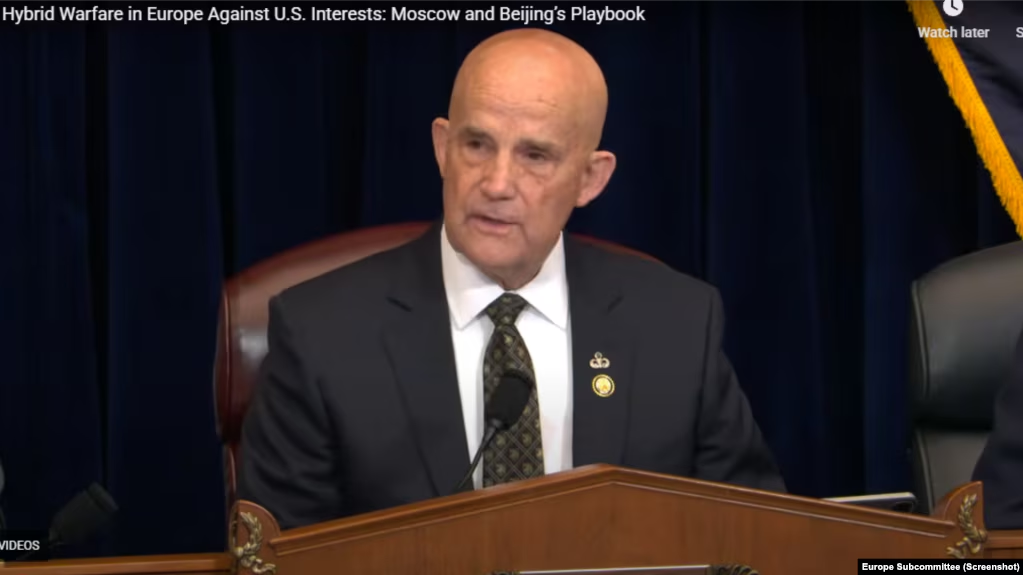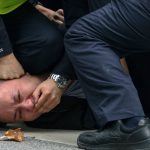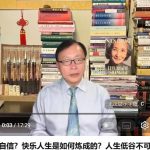November 6, 2017

Wen Donghai (文东海) is a 43-year-old lawyer in Changsha, Hunan Province. He grew up in a mountainous village and became a policeman in the Changsha Municipal Public Security Bureau. Bored and unfulfilled, he quit his job, went to graduate school and became a lawyer in 2009. He came into contact with human rights lawyers in 2014, and in 2015 was a defense lawyer in the case of three Guangzhou activists promoting non-violent resistance and civil disobedience. That was the first human rights case he took on.
When the July 9, 2015 (709) crackdown on human rights lawyers began, he became the defense lawyer for Wang Yu, the first of scores of lawyers arrested that day and afterward. But he was not allowed to meet his client despite making numerous trips to Tianjin and lodging several complaints.
He has taken on Falun Gong cases as well as many other cases across China. “After becoming Wang Yu’s lawyer, I wanted to understand what Wang Yu had done and what kind of group Falun Gong was, so I started taking Falun Gong cases,” Wen Donghai told the Falun Gong newspaper Epoch Times in a recent interview.
‘Investigated’ for ‘Disrupting Court Order’
On July 14, 2017 Wen Donghai received a notice from the Hunan Province Lawyers’ Association. The Superior Court of Yunnan Province complained that during a trial held in a lower court in E’shan County (云南玉溪市峨山县人民法院) defense lawyer Wen Donghai “seriously disrupted the court order,” and that the association was asked to investigate.
On August 4 the Changsha Municipal Justice Bureau, the government organ in charge of lawyers, notified Wen Donghai that he was under investigation for “disrupting court order and interfering in court hearings.”
Wen Donghai has since learned that there was another “complaint” against him by a court in Guangdong Province.
What Happened During the Two Trials
Li Qiongzhen (李琼珍) is a Falun Gong practitioner in E’shan county, Yuxi city, Yunnan province (云南玉溪市峨山县) and was arrested with four others in 2016 for distributing Falun Gong materials. Wen Donghai was her defense lawyer.
Meeting with his client on January 24, 2017, Wen Donghai learned that the presiding judge of the case Bai Weiliang (柏为良) showed up at the detention center with two unidentified women and interrogated his client for three days in a row from January 11-13. The judge asked her to admit guilt in exchange for bail or a suspended sentence. He warned her not to mention the term “Falun Gong” during the trial. The judge also told Wen’s client that her lawyer took up the case in order to “stir up trouble,” and that if she dismissed him, the judge would find local lawyers for her free of charge. The two women, who had not identified themselves, told Wen’s client that she was forbidden to practice Falun Gong in prison.
Wen Donghai recorded his meeting with his client in detailed transcripts.
On February 13, 2017 Wen filed a complaint with the procuratorate against the judge’s illegal behavior. During the trial on February 16, 2017, he requested the presiding judge and the collegial panel recuse themselves, but his request was promptly denied.
He went on confronting the judge on his illegally pressuring his client to admit guilt and to dismiss her lawyer. The angry presiding judge and Wen had heated arguments, causing the trial to be adjourned twice.
Defending his client, who was charged with “using a cult to obstruct the implementation of the law,” Wen Donghai pointed out that there is not a single law in China that says Falun Gong is illegal; that thought, expression, and faith cannot cause the implementation of the law to be obstructed; that the Supreme Court’s judicial explanation of this crime is unconstitutional and illegal and can’t be used as the basis for a ruling; and that freedom of belief is a universal value.
The court handed out a particularly harsh sentence to Wen’s client: four years in prison for spreading Falun Gong materials.
The other complaint against lawyer Wen Donghai came from Jinping District court, Shantou city, Guangzhou province. Wen was the defense lawyer for Peng Peishan (彭佩珊), the owner of a hair salon and Falun Gong practitioner. Police suspected that she and her husband sold calling cards to practitioners to be used for spreading Falun Gong content. She was tried along with her husband and two others on April 11, 2017.
Wen Donghai said the court didn’t allow the defense lawyers to speak. He said to the court, “If you don’t allow me to speak, you may as well expel me from the court.” The judge did just that. Wen went to the procuratorate to complain about the judge, but was blocked by a formation of police at the entrance. The procuratorate didn’t accept his complaint.
Method of Targeting
Wen Donghai said that once you are identified as a crackdown target, they take the following steps: they go to different provinces to examine the cases you represented and find the “problems” they are looking for. Then in Wen’s case, the Lawyers Association in Hunan worked with the Superior Court in Yunnan that filed a complaint against Wen.
In Wen’s case, the director of Office for Management of Lawyers of Changsha Municipal Bureau of Justice had spent days in both Yunnan and Guangdong to collect information about Wen Donghai. Wen said that nobody paid attention, let alone working so hard, to look into it when he submitted complaints about the judge.
All of them are doing the bidding of the Justice Bureau. Wen Donghai told the Falun Gong newspaper Epoch Times: “When lawyers’ rights are violated, for example, when facing abuses by prosecutors or judges, no one accepts our complaints. But when we fight for the rights of our clients, we are accused of violating the rules for a little bit of heat on our part.
China Change learned from a couple of other lawyers that their local Justice Bureau also had sent officials to locations to collect information about their actions in the courts, the purpose of which is clearly for possible punishment.
‘The Law, Not the Judge, Dictates the Court’
In August, lawyer Wen Donghai issued a response to the ill-intended “investigation” against him. He wrote, “In both cases, whether in the E’shan county court in Yunnan or the Jinping District Court in Shandong, Guangdong, the court flagrantly infringed on the rights of the defense counsel and the defendants.” He continued to give an account of what happened in each case:
“Such a court is no more than a slaughterhouse that creates injustice and produces wrongful convictions. To maintain the order of such an illegal court is akin to committing a crime. My only trespass was that I was unwilling to cooperate with the court and trample on the law. I argued with the court because I hoped for a more normal trial. If there were any other channel for us to defend our rights, we would not have confronted the judge. This case is by no means an isolated one. In representing clients persecuted for their faith, I have repeatedly found myself in a situation where I have no place to lodge a complaint. In dealing with such cases, the nation’s judiciary seems to have turned into a rusted machine beset with problems at any given moment that we cannot solve.”
He argued that:
“The legality of the court is based on the law, not the judge. Thus, even though the judge directs the court, not all questioning of and argument with the judge constitutes disrupting the court order. On the contrary, oftentimes, the defense counsel and the defendant fight hard not to disrupt the court order, but to seek a just court whose order has been disrupted, a court that submits to the law. In doing so they are maintaining the normal working of the court and resist illegal court proceeding, at least that’s what they believe they are doing.”
Tools to Restrict Human Rights Lawyers
In China, from the early 2000s onward, more and more lawyers have engaged in so-called sensitive cases involving political opposition, freedom of expression, religious freedom, and other situations where citizens seek to redress injustice in the hands of the government. The Chinese government has kept close tabs on this small but growing group. Of the 14 human rights lawyers selected as the Persons of the Year in 2005 by the Hong Kong-based Yazhou Weekly (《亚洲周刊》), 13 were kidnapped, tortured, imprisoned, disbarred, or exiled, with the exception of lawyer Mo Shaoping (莫少平).
Even though its number has been growing, the number of China’s 300,000 lawyers who are willing to take on cases to defend human rights is only about 1/1000.
The crackdown on human rights lawyers reached an extreme in 2015 when in a national campaign that began on July 9 China detained scores of them and activists working with them, and questioned more than 300 across China. In recent years the hostility toward human rights lawyers has worsened. They have been regarded as the top threat to the security of the totalitarian regime along with dissidents and activists, faith groups, internet opinion leaders and petitioners.
Almost all of the 709 detainees have been subjected to severe torture. Some of these cases have been exposed, shocking the international community. Those who have been released on bail or given suspended sentences have been closely surveilled and limited in their ability to speak and move. At least three are still in custody (here, here, and here).
The 709 Incident was meant to be a paralyzing blow to human rights lawyers, but that doesn’t seem to be the case. They are persisting under incredible pressure, making immense sacrifices both professionally and personally.
Two years after the 709 Crackdown, the Chinese government has not lessened its intent to further restrict the space for lawyers defending human rights cases. But since 709, the authorities have resorted to “softer” and more insipid methods to contain them that may not draw international attention. These methods include: “complaint” and “investigation,” such as lawyer Wen Donghai faces, motivated by intent to punish; law firms being audited; lawyers annual reviews being postponed and denied; suspension of practice; or outright disbarment. In a recent case, a lawyer in Shandong Province was disbarred for defending a freedom of expression case.
Many human rights lawyers are barred from traveling outside China, whether for business or for leisure. The reason given to them is that they are a “national security threat.”
On October 30 lawyer Wen Donghai received a notice from the Changsha Justice Bureau. The investigation has concluded and “the facts and evidence are clear that you have allegedly disrupted court order and interfered with the court hearing, and administrative sanctions should be levied against you according to the law. Given the serious nature of your case, we have submitted it to a higher level of judiciary organ for decision.”
Lawyer Wen Donghai’s situation is a cause for concern. One by one, China is disqualifying its most courageous human rights lawyers and is testing the waters to see what kind of response this gets. So we are calling on the international media, governments, institutions, and legal organizations to pay close attention to the worsening professional environment that China’s brave and die-hard human rights lawyers face.











